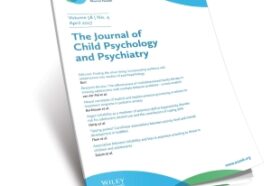In this Papers Podcast, Professor Jonathan Green discusses his CAMH journal Debate paper ‘Debate: Neurodiversity, autism and healthcare’ (https://doi.org/10.1111/camh.12663). This podcast coincides with World Autism Acceptance Week.
Discussion points include:
- The current experience of CAMH professionals working in the field of neurodiversity.
- The evolution of the autism concept and where we are currently in our understanding.
- The different realities of autism (as a clinical concept, an administrative term, and as a self-identification) and whether these different realities can co-exist.
- The risk of fragmentation and loss of a common language and why it matters to have a common language.
- Insight into an evidence-based framework for autism.
- Autism as emergent and transactional and the impact for CAMH professionals.
In this series, we speak to authors of papers published in one of ACAMH’s three journals. These are The Journal of Child Psychology and Psychiatry (JCPP); The Child and Adolescent Mental Health (CAMH) journal; and JCPP Advances.
Subscribe to ACAMH mental health podcasts on your preferred streaming platform. Just search for ACAMH on; SoundCloud, Spotify, CastBox, Deezer, Google Podcasts, Podcastaddict, JioSaavn, Listen notes, Radio Public, and Radio.com (not available in the EU). Plus we are on Apple Podcasts visit the link or click on the icon, or scan the QR code.

Jonathan Green is Professor of Child and Adolescent Psychiatry at University of Manchester and Hon Consultant Child and Adolescent Psychiatrist at the Royal Manchester Children’s Hospital. He studied medicine at Cambridge, Paediatrics in London and Psychiatry in Oxford before establishing clinical and research groups in Manchester, UK. He has focused clinically and in research on early social and relational development in children generally, and on autistic development in particular. His group has led development and testing of early parent-mediated interventions for autistic development for both pre-school diagnosed children (PACT) and in the pre-diagnostic stage (iBASIS); and built on this evidence to advocate an early developmental pathway approach to autistic care that is now being applied in UK and internationally.
In the last few years, he has undertaken increasing participatory work with the autistic community, including discussion on neurodiversity and the ethics of intervention, explorations of autistic phenomenology and full co-design of a new anxiety intervention for young autistic children.
Jonathan sat on the most recent UK NICE development group for autism. He is a Senior Investigator in NIHR, Fellow of the UK Academy of Medical Sciences, and UK Global Senior Leader for autism for the International Society of Autism Research (INSAR).
Other resources
- ACAMH Featured CAMH journal Debate Paper ‘Debate: Neurodiversity, autism and healthcare’, (July 2023), Jonathan Green
- CAMH journal Commentary ‘A spectrum for all? A response to Green et al. (2023), neurodiversity, autism and health care’, (July 2023), Andrew Whitehouse
- CAMH journal Commentary ‘Reviewing neurodiversity, autism, and healthcare by Jonathan Green (2023) from an autistic perspective’, (July 2023), Rhiannon Hawkins
- CAMH journal Debate Paper ‘Responses to commentaries – neurodiversity, autism and healthcare’, (December 2023), Jonathan Green




Discussion
I feel this is an important component that has been neglected by society, especially in African countries where myths, beliefs and misconceptions about autism are very high. Stigma, isolation of people with autism from families, uncaring attitudes and support, discrimination on opportunities, and other negative vices that disadvantage such minority and vulnerable groups.
I feel more awareness, engagements, involvements, participation, and policy must be done at all levels. We must bring necessary organizations that can help address these negative vices on the people living with Autism.
My organization deals with mental health related issues in Zambia and can contribute positively to these issues. Thank you!